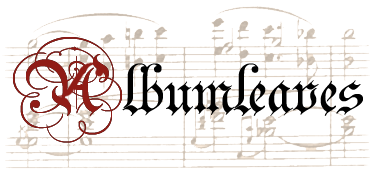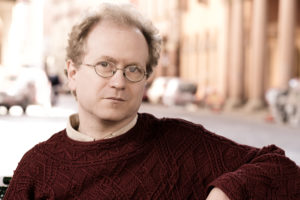Albumleaf 210: July 3, 3025 (Bologna)
-
David Salvage started Albumleaves in 2010 and composes and performs all the “’leaves,” unless otherwise indicated. The pieces are written by hand without the assistance of notation software, algorithms, or A.I. and are recorded at home or in a practice room. While the vast majority are self-standing compositions, they are often written to contrast with one another musically or develop ideas proposed in earlier pieces. As they appear here, the ‘leaves are best regarded as advanced drafts of compositions that might be revised ahead of commercial release. Output is irregular, but new ‘leaves tend to be posted around once a month.
-
RECORDINGS
-
Released August 2025 on New Focus Recordings
-
Released October 2021 on Deux-Elles Classical Recordings
-
FOLLOW DAVID on Facebook.
-
OTHER PLACES TO FIND SALVAGE'S MUSIC
-
Salvage's music is published by Universal Edition Vienna.
-
Some of Salvage's longer compositions can be found on his SoundCloud page.
-
Categories
-
Archives
- December 2025
- November 2025
- October 2025
- August 2025
- July 2025
- June 2025
- January 2025
- June 2023
- December 2022
- November 2022
- October 2022
- September 2022
- August 2022
- July 2022
- June 2022
- May 2022
- February 2022
- January 2022
- December 2021
- October 2021
- September 2021
- June 2021
- May 2021
- February 2021
- January 2021
- December 2020
- November 2020
- October 2020
- April 2020
- March 2020
- February 2020
- December 2019
- October 2019
- July 2019
- June 2019
- April 2019
- March 2019
- February 2019
- January 2019
- December 2018
- November 2018
- October 2018
- September 2018
- August 2018
- July 2018
- June 2018
- May 2018
- April 2018
- March 2018
- February 2018
- January 2018
- November 2017
- October 2017
- May 2017
- April 2017
- September 2016
- December 2015
- November 2015
- October 2015
- February 2014
- December 2013
- September 2013
- August 2013
- July 2013
- June 2013
- May 2013
- April 2013
- March 2013
- February 2013
- January 2013
- December 2012
- October 2012
- September 2012
- August 2012
- July 2012
- May 2012
- April 2012
- March 2012
- February 2012
- January 2012
- October 2011
- September 2011
- August 2011
- July 2011
- June 2011
- May 2011
- April 2011
- January 2011
- December 2010
- November 2010
- October 2010
- September 2010
- August 2010
- July 2010
- June 2010
- May 2010
- April 2010



